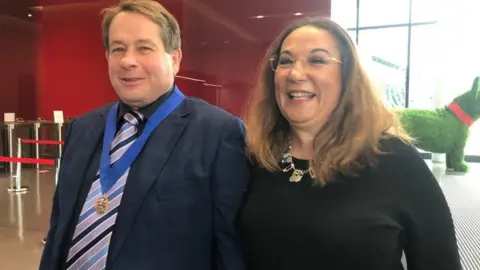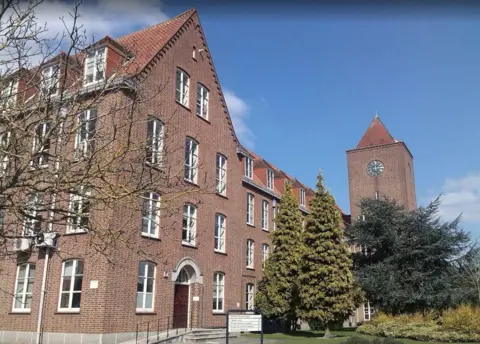Spelthorne Conservatives lose control of council after split
 Ian Harvey
Ian HarveySix Spelthorne councillors have left the Conservatives and set up their own group, leaving the authority under no overall control.
Council leader Ian Harvey, one of the six to leave, said there had been serious bullying and they had resigned.
The remaining Tories called for them to stand for election, and said they did not recognise the allegations.
Opposition Liberal Democrat members criticised the "in-fighting" during the Covid-19 pandemic.
A statement from the Liberal Democrats said: "Far from the inclusive and positive effort that we have contributed [to] and supported during this crisis, we now find ourselves in a situation that distracts from key issues."
'No electoral legitimacy'
Spelthorne Conservative Association said the row started on Monday after Mr Harvey was challenged for the leadership of the Tory group and John Boughtflower was made leader.
The Conservatives said Mr Harvey left the party while the other five were suspended, adding: "Until such time as they stand and fight a by-election under their new colours, they have no electoral legitimacy."
Tory councillor Jim McIlroy said allegations of bullying made by those who left were "shameful, sordid, and not worthy of a response".
"We will not allow ourselves to be distracted. Our focus is on the residents of Spelthorne - they will always come first," he said.
Mr Harvey, who with the other five set up the United Spelthorne Group, said there had been "bullying, misogyny, hounding and intimidation".
He said he withdrew his candidature at Monday's meeting and Mr Boughtflower was not elected but took over by default.
He told the BBC he had faced criticism after he became the driving force behind a £1bn council spend on commercial property since 2016.
Spelthorne's property investments have been the focus of an investigation by the Bureau of Investigative Journalism, which reported growing concerns over the financial strategy.
Mr Harvey described it as a model used to generate "substantial, sustainable long-term income", but said it had been used "as a cosh" against him.
He said the borough had faced a severe financial crisis in 2016 when he became leader, adding: "Our renowned investment strategies have reinvigorated Spelthorne finances."

 Google Maps
Google MapsJack Fiehn, political reporter, BBC News
The issue of how much Spelthorne has borrowed for investments has been a controversial subject, with the council estimated to have spent £1bn since 2016.
The argument is that this has helped to close the financial gaps the local authority faced during austerity.
Mr Harvey has said more than 50% of Spelthorne's disposable income, which goes to the general fund and provides services, comes from investments - but eyebrows have been raised elsewhere.
In May, the chief executive of the Chartered Institute of Public Finance and Accountancy, Rob Whiteman, told the Commons Public Accounts Committee that in his view Spelthorne had borrowed too much and he was concerned there had been "excessive leverage and commercial risk".
Meanwhile, the government is looking at whether councils should be prevented from making investments to this extent in the future.

